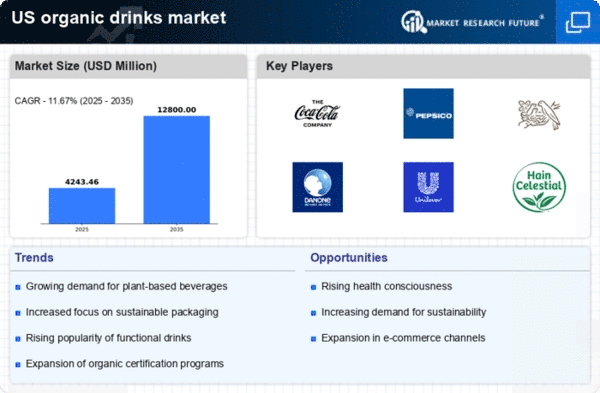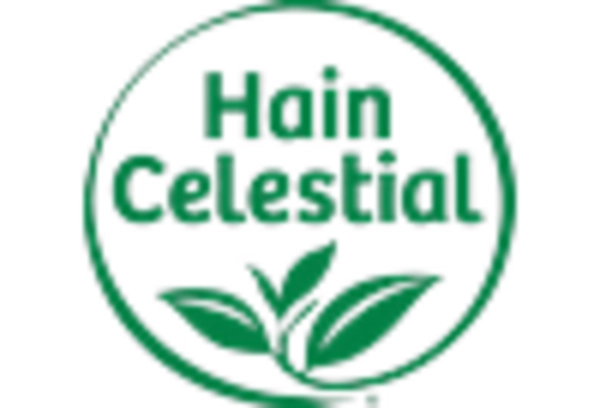Rising Consumer Awareness
The organic drinks market is experiencing a notable surge in consumer awareness regarding health and nutrition. As individuals become increasingly informed about the benefits of organic ingredients, they are more inclined to choose beverages that align with their health goals. This trend is reflected in the market data, which indicates that organic drink sales have grown by approximately 20% over the past year. Consumers are actively seeking products that are free from artificial additives and preservatives, further driving the demand for organic options. This heightened awareness is not only influencing purchasing decisions but also encouraging manufacturers to innovate and expand their organic product lines, thereby enhancing competition within the organic drinks market.
Evolving Consumer Preferences
The organic drinks market is significantly influenced by evolving consumer preferences, particularly among younger demographics who prioritize health and sustainability. Millennials and Generation Z are increasingly opting for organic beverages as part of their lifestyle choices, often seeking products that align with their values. This demographic shift is reflected in market data, which shows that organic drink consumption among younger consumers has increased by over 25% in the last two years. As these consumers become more influential in the market, their preferences are likely to shape product development and marketing strategies, prompting brands to innovate and cater to their specific tastes and values.
Expansion of Distribution Channels
The organic drinks market is experiencing an expansion of distribution channels, which is facilitating greater access to organic beverages for consumers. Retailers are increasingly dedicating shelf space to organic products, and e-commerce platforms are becoming vital for reaching a broader audience. This trend is supported by data indicating that online sales of organic drinks have surged by approximately 30% in the past year. As distribution channels diversify, consumers are finding it easier to purchase organic beverages, thereby driving market growth. This expansion not only enhances visibility for organic brands but also encourages competition, as more players enter the organic drinks market to capitalize on the growing consumer demand.
Shift Towards Clean Label Products
The organic drinks market is witnessing a significant shift towards clean label products, as consumers increasingly prefer transparency in ingredient sourcing and production processes. This trend is driven by a desire for authenticity and trust in food and beverage choices. According to recent surveys, nearly 70% of consumers express a preference for products with simple, recognizable ingredients. This demand for clean labels is prompting brands to reformulate their offerings, ensuring that they meet consumer expectations for organic certification and minimal processing. As a result, the organic drinks market is likely to see a proliferation of new products that emphasize clean labels, catering to the evolving preferences of health-conscious consumers.
Increased Availability of Organic Ingredients
The organic drinks market benefits from the growing availability of organic ingredients, which has been bolstered by advancements in agricultural practices and supply chain logistics. As more farmers adopt organic farming methods, the supply of high-quality organic raw materials has expanded, allowing beverage manufacturers to create a wider variety of organic drinks. This increase in ingredient availability is crucial, as it supports the growing demand for organic beverages, which has seen a rise of approximately 15% in recent years. Furthermore, the establishment of partnerships between organic farmers and beverage companies is enhancing the sustainability of the supply chain, thereby reinforcing the market's growth potential.
















